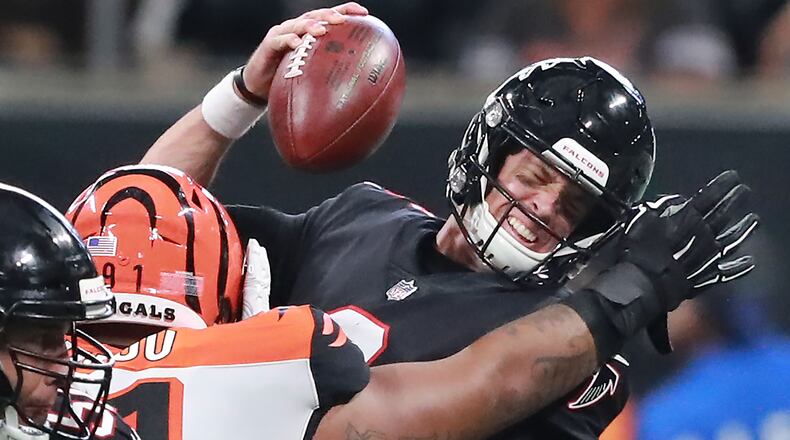An NFL team plays once a week. An MLB club plays every day. Yet the belief here is that momentum matters more in football than in baseball, where momentum is – this proclamation is widely credited to Earl Weaver – tomorrow’s starting pitcher.
An NFL team that catches a rolling start can outperform its presumed station. We recall 2004, when the Falcons under Jim Mora won their first four games and wound up playing for the NFC title. That team wasn’t anything special – its best receivers were Alge Crumpler, a tight end, and Peerless Price, the expensive free agent who would be cut the next summer – and Mora would soon prove he wasn’t the second coming of Vince Lombardi. Still, it had Michael Vick and Warrick Dunn, and it didn’t lose two in a row until it clinched a playoff berth.
These Falcons are, on paper, far better than that bunch. But their defense has been decimated by injury – at the end of Sunday’s loss to Cincinnati, Grady Jarrett was absent with an ankle injury, making him the latest in an ongoing saga – and the team we see isn’t the team we expected. On Labor Day, could we have imagined that the season’s fourth game would be decided by Isaiah Oliver, rookie cornerback, allowing A.J. Green, among the league’s best wideouts, to run free inside the final 10 seconds?
Losing Keanu Neal was massive because he’s the prototype of a Dan Quinn Guy. Losing Deion Jones was just as big because he’s the Falcons’ best defensive playmaker. Losing Ricardo Allen deprived them of their best on-field communicator. Takkarist McKinley missed the overtime loss to New Orleans, which meant they faced Drew Brees without their best pass rusher. As much as the Falcons believed that they’d built a deep roster, absences have consequences. There’s a reason second-stringers are second-string.
A defense envisioned as the Falcons’ best this century ranks 29th among 32 NFL teams in total yards and points, next-to-last in third-down conversions and last in first downs. Cincinnati’s defense is similarly lousy, but the Bengals won a coin-flip game Sunday. They’re 3-1 and tied for the lead in the AFC North. The Falcons, 1-3, occupy last place in the NFC South.
The Falcons have lost three coin flips, and the narrow Carolina victory saw Cam Newton’s pass hit a Panther receiver’s hands in the end zone on the final play. You can say that the Falcons have been ridiculously unlucky, and you wouldn’t be wrong. Still, luck rarely favors a team that can’t defend. If you get unlucky enough early enough, your season could be done before fortune can turn.
That’s where these Falcons are: They must win in Pittsburgh, never the easiest place, to give themselves any realistic hope of salvaging the season. The schedule eases after their trip to Heinz Field, but they still face games at New Orleans, Green Bay and Carolina, and they have Baltimore and Dallas here. (And the Falcons are only 6-5 at Mercedes-Benz Stadium.) If they fall to 1-4, their chance of a 10-win season will be reduced to hoping against hope, and 9-7 doesn’t often buy a wild card.
When a team is 1-4 (or even 1-3), the temptation is mighty to see itself as cursed, as forlorn, as a loser. That’s what Quinn is fighting – not just injuries, not just a defense unable to execute with games on the line, but a Brotherhood-wide sulk. The coach averred Sunday that such a thing might happen to some teams but not his. Really, though, what’s he going to say? “Damn, we’re in a tight spot”?
As someone who has tweaked Quinn and his assistants in the past, I have to say: This 1-3 is function of players, or the absence thereof, more than coaching. Steve Sarkisian has called three fine games in a row. The Falcons rank seventh in total offense, sixth in passing yards and points. They’ve scored 104 points over three games; they’ve won once. As good as this offense has been, it can’t outscore its own defense. Not to stretch the baseball analogy past the breaking point, but the Falcons have become a team with a bad bullpen. No lead is impregnable, and nothing rankles like a come-from-ahead loss.
Unlike baseball players, footballers don’t get to try again the next day. They have a week to stew; to hear the criticism in their city and – thanks to the sunny nature of social media – worldwide; to wonder if they really are as bad as all that. This is where momentum in football enters: A team that starts well begins to believe; a team that doesn’t can become a den of doubters.
Matt Ryan said it Sunday: “A little bit of momentum is a good thing, and we need to get that momentum going.” The Falcons do, and it must start in Pittsburgh. One stroke of luck: The ballyhooed Steelers are 1-2-1 and can’t defend, either. Meaning: One more shootout is at hand, and the outcome of this one could tell the tale of a season. Win and there’s a glimmer of hope. Lose and there’s only gloom and doom.
About the Author
The Latest
Featured



